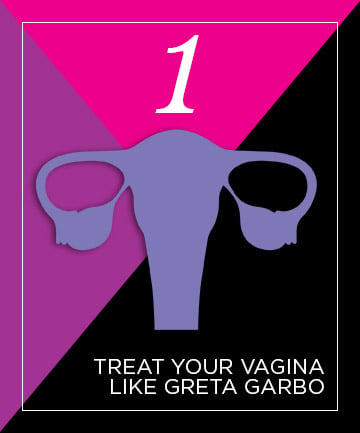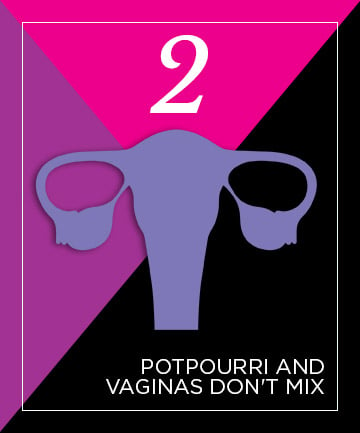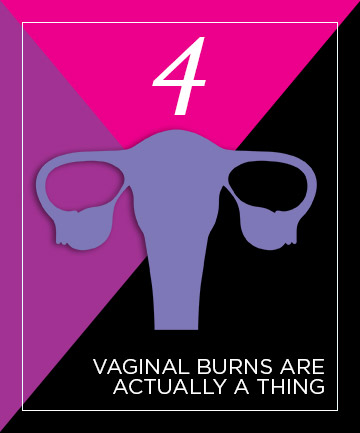Our vaginas are dirtier, smellier and more toxin-filled than ever -- or at least that's what the personal-care industry leads us to believe. A quick Google search can acquaint you with more vaginal cleansing products and treatments than you probably knew existed. You can make your vagina smell like fruits and flowers with deodorizing washes, sprays, wipes and suppositories; clean it with probiotic douches; "detoxify" it with herbal sachets; balance its "hormonal levels" with a steam treatment; and "clear" your "chi pathways" by sticking a jade egg in it.
In short, the trendy, rather bourgey obsession with detoxes, cleanses and "natural" remedies has finally extended to how we care for our vaginas. For those of us who hate-read Goop, it's tempting to categorically pooh-pooh these precious vaginal care regimens. On the other hand, is there really any harm in going the extra mile toward vaginal cleanliness? What, exactly, is the problem with f$&#ing with an occasional vinegar douche or vaginal gemstone?
We brought our questions to two experts in lady-parts: Mary Jane Minkin, MD, clinical professor of obstetrics and gynecology at Yale University School of Medicine; and Barb DePree, MD, OB/GYN with Lakeshore Health Partners. And some of their answers, frankly, shocked us.
Here are seven reasons why you should say "hell, no" to that so-called vaginal detox.
Image via Getty
In short, the trendy, rather bourgey obsession with detoxes, cleanses and "natural" remedies has finally extended to how we care for our vaginas. For those of us who hate-read Goop, it's tempting to categorically pooh-pooh these precious vaginal care regimens. On the other hand, is there really any harm in going the extra mile toward vaginal cleanliness? What, exactly, is the problem with f$&#ing with an occasional vinegar douche or vaginal gemstone?
We brought our questions to two experts in lady-parts: Mary Jane Minkin, MD, clinical professor of obstetrics and gynecology at Yale University School of Medicine; and Barb DePree, MD, OB/GYN with Lakeshore Health Partners. And some of their answers, frankly, shocked us.
Here are seven reasons why you should say "hell, no" to that so-called vaginal detox.
Image via Getty
Like a beautiful, reclusive film star, your vagina wants to be left alone. Tampons and other people's genitals can usually make a cameo in your vagina's movie without causing major issues, but the vagina is a delicate organ that's easily perturbed by foreign bodies.
"It sounds strange to many of my patients, but acid is a good state of affairs in the vagina," says Minkin. "Many products -- blood and seminal fluid, too -- tend to be basic and can disrupt the pH balance," she adds. (Insert joke about your vagina not being basic.)
So what's so wrong with altering the vagina's pH balance? "Any disruption to this fine balance can make a woman more prone to infection," says DePree. The vagina has an "abundance" of "good" bacteria, known as lactobacilli, she explains. "The addition of products may disrupt this balance and allow for overgrowth of less desirable bacteria or yeast."
The vagina can be compared to the GI tract, DePree says. "The vagina is also very porous, it readily absorbs products," she asserts, comparing the vagina to the gastrointestinal tract. "It important to apply the same safety [standards to] vaginal products" as to those you ingest, she says.
Image via Getty
"It sounds strange to many of my patients, but acid is a good state of affairs in the vagina," says Minkin. "Many products -- blood and seminal fluid, too -- tend to be basic and can disrupt the pH balance," she adds. (Insert joke about your vagina not being basic.)
So what's so wrong with altering the vagina's pH balance? "Any disruption to this fine balance can make a woman more prone to infection," says DePree. The vagina has an "abundance" of "good" bacteria, known as lactobacilli, she explains. "The addition of products may disrupt this balance and allow for overgrowth of less desirable bacteria or yeast."
The vagina can be compared to the GI tract, DePree says. "The vagina is also very porous, it readily absorbs products," she asserts, comparing the vagina to the gastrointestinal tract. "It important to apply the same safety [standards to] vaginal products" as to those you ingest, she says.
Image via Getty
Vaginal cleansing products are nothing new; douching has been practiced in various forms since the 19th century. But today, thanks to the internet, women are exposed to a wider variety of vaginal cleansing products and practices than ever before.
One of those products is the "yoni pearl," a small bag of herbs or medicinal plants meant to be inserted in the vagina for hours or days at a time. Name-brand products include Goddess Vaginal Detox Pearls and Yummy Yoni Pearls. Shockingly, you can even find homemade versions on Etsy.
Although vaginal detox pearl ingredients differ from manufacturer to manufacturer, they are often marketed with similar-sounding, dubious claims. Yummy Yoni Pearls' website asserts that the pearls -- stuffed with herbs including motherwort and angelica -- aid with "detoxing and breaking down blockage inside the vagina... [They] can eliminate endometriosis, fibroids, vaginal [odor], tubal blockages, infertility and more."
Yummy Yoni Pearls' website also directs users to leave the pearls in the vagina for three days at a time. Now, consider the fact that the U.S. Food and Drug Administration recommends tampon users "limit wear-time per tampon to no more than eight hours" to prevent toxic shock syndrome. Wincing yet?
Not surprisingly, neither Minkin nor DePree sign off on yoni pearls. "I would like to know the complete composition of any herbal suppository before placing it in the vagina," Minkin says, "and certainly before leaving it in place for any amount of time."
"The vagina has the ability to self-clean -- really, it does," DePree insists. "Resist the urge to add, insert, scrub and detox!"
Image via Getty
One of those products is the "yoni pearl," a small bag of herbs or medicinal plants meant to be inserted in the vagina for hours or days at a time. Name-brand products include Goddess Vaginal Detox Pearls and Yummy Yoni Pearls. Shockingly, you can even find homemade versions on Etsy.
Although vaginal detox pearl ingredients differ from manufacturer to manufacturer, they are often marketed with similar-sounding, dubious claims. Yummy Yoni Pearls' website asserts that the pearls -- stuffed with herbs including motherwort and angelica -- aid with "detoxing and breaking down blockage inside the vagina... [They] can eliminate endometriosis, fibroids, vaginal [odor], tubal blockages, infertility and more."
Yummy Yoni Pearls' website also directs users to leave the pearls in the vagina for three days at a time. Now, consider the fact that the U.S. Food and Drug Administration recommends tampon users "limit wear-time per tampon to no more than eight hours" to prevent toxic shock syndrome. Wincing yet?
Not surprisingly, neither Minkin nor DePree sign off on yoni pearls. "I would like to know the complete composition of any herbal suppository before placing it in the vagina," Minkin says, "and certainly before leaving it in place for any amount of time."
"The vagina has the ability to self-clean -- really, it does," DePree insists. "Resist the urge to add, insert, scrub and detox!"
Image via Getty
The internet was all atwitter when the wellness brand Goop published this Q&A with actress/blogger Shiva Rose. Rose endorses the use of jade "yoni eggs," stones that are inserted into the vagina for hours or days at a time. She claims these stones have "incredible clearing, cleansing powers" and "intensify feminine energy." Rose also adds that the eggs "cultivate sexual energy, increase orgasm, balance the cycle" and "tighten and tone."
Goop echoes these sentiments, writing "Jade eggs' power to cleanse and clear make them ideal for detox." Simultaneously, Goop began selling jade and rose quartz yoni eggs on its website for $66 and $55 apiece, respectively. The story sparked an ongoing feud between Goop and Dr. Jen Gunter, an OB/GYN and blogger who insists that leaving the porous yoni egg in the vagina could cause toxic shock syndrome. Goop's official response: "There is no case/study/report which links the two."
DePree agrees with Goop's editors that there are no clinical studies about jade's effect on the vagina, as far as she knows -- which is exactly why you shouldn't be putting rocks in your special place.
"I have seen no clinical trials on the safety of placing a jade object in the vagina, nor have I seen evidence of its benefits or outcomes in detoxing or improving sex," says DePree. "So I'd say the absence of studies linking jade eggs to TSS is the same issue I have with saying the jade eggs benefit with detoxing and improving sex: Show me the data."
"There is also the risk of ulceration," she continues. "An object pressing on the walls of the vagina over a long period of time may erode or break down the vaginal lining... Think about sticking a marble in the corner of your mouth for days. It is likely to ulcerate the area it is in contact with over time."
"There is no reason to believe that placing any crystals in the vagina should be helpful," Minkin agrees. "If these are abrasive, they could cut the tissue. And if they are smooth and inert, I have no scientific reason to believe they are doing anything therapeutic."
There is a kernel of truth to the jade-egg idea: Many doctors recommend vaginal devices or weights to tone pelvic floor muscles. But these products are supposed to be inserted in the vagina for short periods of time, Minkin says. And they aren't made of jade, quartz or other so-called energy-imparting stones.
Image via Getty
Goop echoes these sentiments, writing "Jade eggs' power to cleanse and clear make them ideal for detox." Simultaneously, Goop began selling jade and rose quartz yoni eggs on its website for $66 and $55 apiece, respectively. The story sparked an ongoing feud between Goop and Dr. Jen Gunter, an OB/GYN and blogger who insists that leaving the porous yoni egg in the vagina could cause toxic shock syndrome. Goop's official response: "There is no case/study/report which links the two."
DePree agrees with Goop's editors that there are no clinical studies about jade's effect on the vagina, as far as she knows -- which is exactly why you shouldn't be putting rocks in your special place.
"I have seen no clinical trials on the safety of placing a jade object in the vagina, nor have I seen evidence of its benefits or outcomes in detoxing or improving sex," says DePree. "So I'd say the absence of studies linking jade eggs to TSS is the same issue I have with saying the jade eggs benefit with detoxing and improving sex: Show me the data."
"There is also the risk of ulceration," she continues. "An object pressing on the walls of the vagina over a long period of time may erode or break down the vaginal lining... Think about sticking a marble in the corner of your mouth for days. It is likely to ulcerate the area it is in contact with over time."
"There is no reason to believe that placing any crystals in the vagina should be helpful," Minkin agrees. "If these are abrasive, they could cut the tissue. And if they are smooth and inert, I have no scientific reason to believe they are doing anything therapeutic."
There is a kernel of truth to the jade-egg idea: Many doctors recommend vaginal devices or weights to tone pelvic floor muscles. But these products are supposed to be inserted in the vagina for short periods of time, Minkin says. And they aren't made of jade, quartz or other so-called energy-imparting stones.
Image via Getty
Jade eggs aren't the only vaginal care phenomenon popularized on Goop; its editors also wax poetic about the V-Steam, available at Tikkun Spa in Santa Monica, California, among other places. Tikkun's treatment involves squatting over a boiling herbal tea of mugwort and flower buds for 30 to 45 minutes, letting the steam mingle with one's nether regions.
"A combination of infrared and mugwort steam cleanses your uterus, et al," Goop's website reads. "It is an energetic release -- not just a steam douche -- that balances female hormone levels."
Minkin says she is "very concerned" by the prospect of vaginal steams, "which can lead to burns." "The most delicate tissues women have are the vulva and vaginal tissues," she explains. "The less toxicity to this delicate tissue, the better... There is no biological reason to steam anything."
DePree didn't mince words about vaginal steaming. "If you burn the vaginal walls, the superficial layers of the vagina will slough," she says. "In the healing process, the walls of the vagina may adhere together and create a very difficult situation, essentially obliterating the vaginal canal."
To paraphrase: YOU CAN BURN YOUR VAGINA SHUT.
If burning your vaginal canal closed sounds like a real-life horror show, DePree agrees with you. "I have seen this happen when women have used irritating products," she reports. "It's a nightmare to treat."
Image via Getty
"A combination of infrared and mugwort steam cleanses your uterus, et al," Goop's website reads. "It is an energetic release -- not just a steam douche -- that balances female hormone levels."
Minkin says she is "very concerned" by the prospect of vaginal steams, "which can lead to burns." "The most delicate tissues women have are the vulva and vaginal tissues," she explains. "The less toxicity to this delicate tissue, the better... There is no biological reason to steam anything."
DePree didn't mince words about vaginal steaming. "If you burn the vaginal walls, the superficial layers of the vagina will slough," she says. "In the healing process, the walls of the vagina may adhere together and create a very difficult situation, essentially obliterating the vaginal canal."
To paraphrase: YOU CAN BURN YOUR VAGINA SHUT.
If burning your vaginal canal closed sounds like a real-life horror show, DePree agrees with you. "I have seen this happen when women have used irritating products," she reports. "It's a nightmare to treat."
Image via Getty








